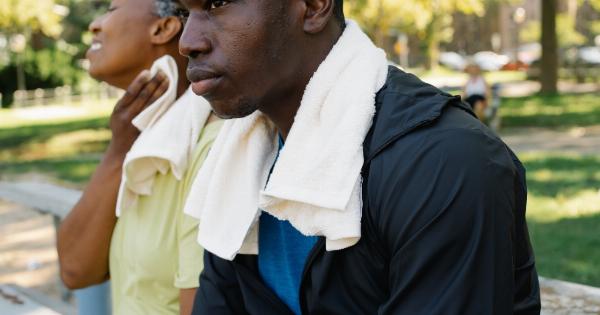Sweating is the body’s natural way of regulating body temperature. It is a process where sweat glands produce sweat, which then evaporates from the skin’s surface. When this happens, it helps to cool down the body.
However, not everyone sweats the same way, and some people may even experience an absence of sweating. In this article, we will explore the science behind why some individuals don’t sweat.
What is sweating?
Sweating is the body’s natural cooling mechanism. The skin has two types of sweat glands: eccrine and apocrine glands. Eccrine glands are more widespread and produce sweat that is odorless.
Apocrine glands are typically located in areas such as the armpits and groin, and they produce sweat that is thicker and has a distinctive odor.
When the body overheats, the eccrine glands produce sweat that is mostly composed of water and salt. As this sweat evaporates from our skin, it helps to cool down the body. This is why we sweat more in hot and humid weather.
However, sweating can also be triggered by stress, anxiety, exercise, or certain medical conditions.
What causes a lack of sweating?
An absence of sweating, or anhidrosis, can be caused by several factors. It could be a result of genetics, medication, or a medical condition.
: Genetics
Sweating is controlled by the autonomic nervous system, which is responsible for regulating our body’s involuntary functions such as breathing, heart rate, and digestion.
Some individuals may have a genetic condition wherein their autonomic nervous system does not function correctly, leading to an absence of sweating.
: Medication
Some medications can also cause a lack of sweating as a side effect. These medications include anticholinergics, antihistamines, and certain antidepressants.
When these drugs block the activity of the nerves that control sweating, it can lead to an absence of sweat.
: Medical conditions
Medical conditions such as hypothyroidism, Parkinson’s disease, and diabetes mellitus can also cause a lack of sweating. These conditions can affect the autonomic nervous system, leading to a disruption in sweating.
Anhidrosis can also be caused by skin damage, such as burns or infections, or nerve damage caused by conditions like multiple sclerosis or Guillain-Barré syndrome.
What are the implications of a lack of sweating?
Absence of sweating can pose health risks, especially in hot and humid weather. When the body cannot regulate its temperature, it can lead to heat exhaustion or heatstroke.
Heat exhaustion is characterized by symptoms such as dizziness, nausea, and headache, whereas heatstroke can be life-threatening and requires immediate medical attention. Other potential complications of anhidrosis include skin infections, inflammation, and swelling.
How is a lack of sweating diagnosed?
A diagnosis of anhidrosis typically involves a thorough physical examination and a review of medical history.
Your doctor may also conduct tests such as a skin biopsy, thermoregulatory sweat test, or nerve conduction studies to determine the underlying cause of your anhidrosis.
How is a lack of sweating treated?
The treatment for anhidrosis depends on the underlying cause. If a medical condition is causing your anhidrosis, your doctor will focus on treating the underlying condition. If medication is the culprit, your doctor may switch you to another medication.
In some cases, surgery or nerve conduction studies may be required to restore sweating in affected areas.
Can a lack of sweating be prevented?
While it may not be possible to prevent anhidrosis entirely, there are some steps you can take to reduce the risk of developing complications.
: Stay hydrated
Drinking plenty of water helps to keep your body hydrated and maintain a healthy body temperature. Carry a water bottle with you at all times and drink water regularly, especially when you are in hot weather or when exercising.
: Avoid extreme temperatures
Try to avoid prolonged exposure to hot and humid weather. If you must be outdoors, wear loose-fitting and light-colored clothes that allow your skin to breathe. Take frequent breaks in the shade and drink plenty of water.
: Take care of your skin
Absence of sweating can lead to dry and itchy skin. To avoid this, keep your skin moisturized and avoid using harsh soaps or shower gels on your skin. Use a gentle, fragrance-free moisturizer to keep your skin hydrated.
Conclusion
Sweating is an essential bodily function that helps regulate body temperature. However, not everyone sweats the same, and some people may experience an absence of sweating.
If you are concerned about your sweating patterns, consult with your healthcare provider to determine the underlying cause and the best treatment option for you.






























